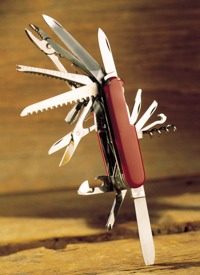
The city of Boston has witnessed over 1,300 knife attacks over the course of the last two years. Politicians in Boston now believe that by restricting the sale of pocketknives, these stabbings will decrease.
On Thursday, the Public Safety Committee of the Boston City Council began holding a hearing on whether they should license the sale of knives in the city of Boston. According to the Boston City Council, the purpose of the hearing is as follows:
That the appropriate committee of the Boston City Council hold a hearing to examine requiring the sale of knives to be licensed by the appropriate police agency that would monitor, regulate and license businesses selling knives. Representatives from the Boston Police Department, Inspectional Services Department, and other interested parties shall be invited to attend.
The ordinance was proposed by two city councilors, Michael P. Ross and Tito Jackson. Ross indicates that he was prompted to consider such legislation when he was asked by Genie Curry of Roxbury — a mother whose son was stabbed to death in 2000, “Why is it that people can buy a knife at their corner store, where their neighbors are buying milk and other household goods? And why are they selling knives to children?”
Curry told Ross, “A lot of people aren’t aware of how available knives are. I probably wouldn’t be aware either if my son hadn’t been stabbed. It needs to end.”
Ross, who notes that a few stores in Boston have broken the law by illegally selling knives with a blade longer than two inches to teenagers, contends, “Clearly, these knives are dangerous weapons being sold casually in a convenience store, and they’re being sold to children.”
According to Ross, “Guns are heavily regulated; knives — there’s virtually no regulation.” While a number of legislators across the country are beginning to call for reduced regulation, Ross is calling for the opposite.
“There is more regulation in milk, and the ability to sell milk in a corner store, than there is to sell a knife…. We have regulations across stores like pawn shops, bike messengers have to be regulated, but this is something that’s just not regulated.”
Jackson observes, “In Boston, we have more stabbings than shootings. But, oftentimes stabbings don’t get the same attention.”
Boston has already acquired a reputation for being tough on the Second Amendment. According to the Blaze, “Current Massachusetts law bans all sorts of weapons and imposes draconian prison terms for their possession. Many knives such as switchblades are illegal outright. You need a license to carry pepper spray.”
In addition to these items, Massachusetts has banned most weapons related to martial arts, such as nonchakus, Kung Fu Sticks, and throwing stars. Those caught in possession of those weapons face possible prison terms of more than two and a half years in prison.
Likewise, those caught in possession of automatic weapons potentially face a life sentence.
Sadly, when lawmakers consider restricting, regulating, or banning weapons, they do not look to historical evidence of success in those endeavors, or ignore the evidence that is so prevalent. Take the United Kingdom, for example. LearnAboutGuns.com reports:
As reported, the number of children in the UK hospitalized with knife attack wounds is up 72% compared to 10 years ago (around when that country’s strict gun control laws were enacted). In other words, not only did gun related crime rise after the gun ban, but so did knife related crime:
As I’ve previously discussed, Britain enacted a series of laws that bars most gun ownership, and restricts the carrying of knives. British citizens who shoot criminals that break into their homes have been convicted of murder, and then denied parole because they showed no remorse for defending themselves, and would “continue to pose a danger to any other burglars." Not surprisingly, criminals increasingly ignore the gun control laws and continue to commit their crimes against the now-defenseless victims.
Despite the past historical failure of gun and knife bans, Jackson asserts that the Boston ordinance would increase public safety.
“The licensing should be for the many stores currently selling knives. This is about plugging a public safety loophole…. We want to make sure that the city as a whole is safer,” he said.




